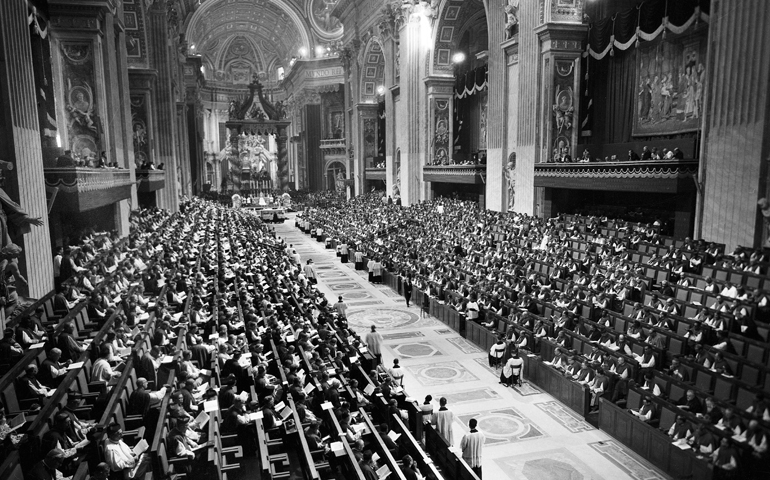
It should be clear to all who have read Part 1 of this essay that many of the leading voices at the Second Vatican Council did not intend to hand down the traditions given to them. They preferred to take it upon themselves to significantly alter, under the guise of making the Catholic faith understandable to modern man, the “pastoral” approaches of Holy Mother Church.
Of course, changing the “pastoral” practices of the Church means a practical change in doctrine (a fact that was admitted by some attendees of the most recent Synod on the Family).
How, exactly, did these new approaches become a reality? Did, as many Catholics are led to believe, the Holy Spirit inspire and guide the discussions that took place at Vatican II? Not exactly. Much of it has to do with the non-Catholic presence at the Council.
Apologists for the Conciliar Church are quick to point out that just because some non-Catholics attended Vatican II as “delegate observers,” that doesn’t mean they influenced the documents in any meaningful way. Patrick Madrid sloppily engages in this sort of argumentation in his 2004 book More Catholic Than the Pope.
Basic research shows that these “observers” had more than a passing influence on the Council’s documents.
Paul Blanshard, perhaps the most well-known American critic of Roman Catholicism at the time, once noted that Methodist observer bishop Fred Pierce was “given the exceptional distinction of several private papal audiences.” Furthermore, Blanshard writes, “the private remarks of some Protestant observers undoubtedly had some effect in shaping Council policy.” At the end of the day, “the Council’s decree on ecumenism actually made a number of important concessions to Protestantism.”
In Michael Davies’ landmark book Liturgical Time Bombs in Vatican II, it is related to the reader that an Anglican Archdeacon claimed that “in the course of the Council itself, the fullest courtesies and opportunities for communication and exchange were allowed to the observers at every stage, and traces of the process can be recognized in the documents themselves.”
Davies also recounts the testimony of Robert McAfee Brown, a Presbyterian observer who reported that “although we had no direct ‘voice’ on the council floor, we did indeed have an indirect voice through the many contacts that were possible with the Fathers and their indispensable strong arms, the periti.”
Cardinal Richard Cushing, the Archbishop of Boston, admits in the book Twelve Council Fathers on p.145 that this sort of sneaky behavior took place quite regularly: “I envied the help in translation that [the delegate observers] were getting from Father Gustave Weigel….I met many of the delegate observers, and on one occasion I invited twenty of them to dinner.”
Question: are these the sorts of antics Catholic Bishops and Cardinals are supposed to engage in? Fraternizing with the enemies of Christ? Of course not. St. Peter, St. Paul, St Alphonsus and countless other Saints constantly warned against this sort of behavior.
I don’t know about you, but a Baptist “bishop” being granted a papal audience strikes me as beyond inappropriate. Moreover, that Anglicans were given “the fullest courtesies” and that Presbyterians had “an indirect voice” on the Council’s documents is enough to taint the entire enterprise.
One “observer” in particular stands out – George Lindbeck, a prominent Lutheran minister. In the 2012 book Postliberal Theology and the Church Catholic, Lindbeck lets the cat out of the bag:
We would be invited to the most extravagant, exalted kinds of receptions, all the observers…one time an eminent Catholic bishop was asking a young Protestant observer for advice on what he should do for his priests….That kind of thing took place all the time. A Connecticut Bishop and I had lunch together once…on what Hans Kung had written.
The highest peak of the ecumenical movement took place at the Second Vatican Council. I say high peak because, just think of it, invited observers, chosen and sent by other churches, were given entrance into the inner circles of the Roman Catholic Church. Their advice was listened to…
In a 1994 interview with George Weigel for First Things, Lindbeck spoke about Pope Pius XII’s condemnation of progressive theology in his encyclical Humani Generis:
The Catholic anti-Modernist campaign of the early twentieth century had created a situation in which a very rigid and biased interpretation of Thomas emerged…
Humani Generis was intended to say “No” to the sorts of approaches represented by the nouvelle theologie…the real problem with Humani Generis was the way it reinforced the position of the regnant powers in the congregations and the academy, who used the encyclical to make the nouvelle theologie people personae non gratae. Which meant that the encyclical reinforced the anti-Modernist style of dealing with exploratory theology.
I think it’s safe to say that had the Church followed Pius XII’s “anti-Modernist style of dealing with exploratory theology,” more souls would have been saved. Come to think of it, had the Church disallowed “delegate observers” of any kind from attending the Council in the first place, we’d all be better off.
